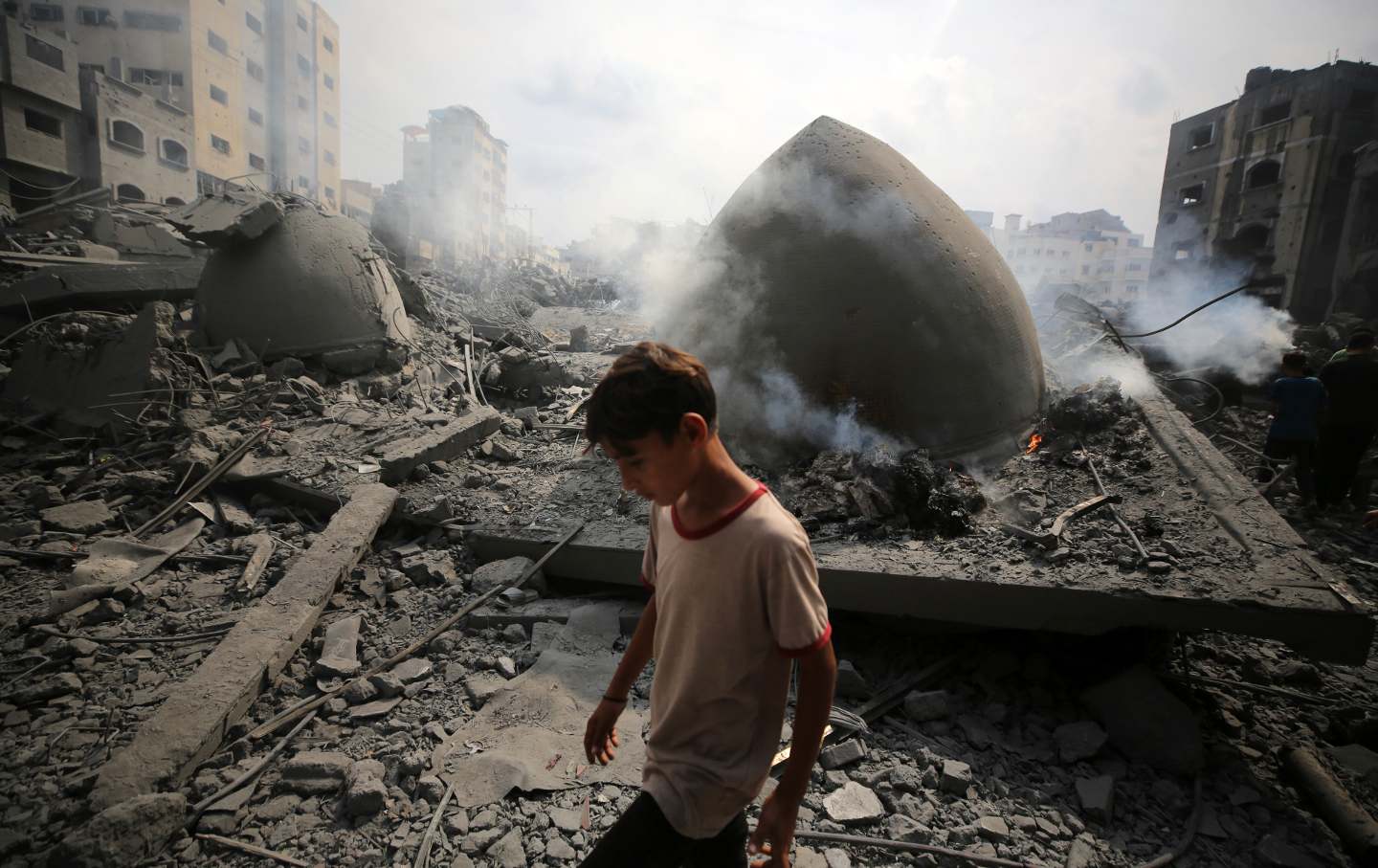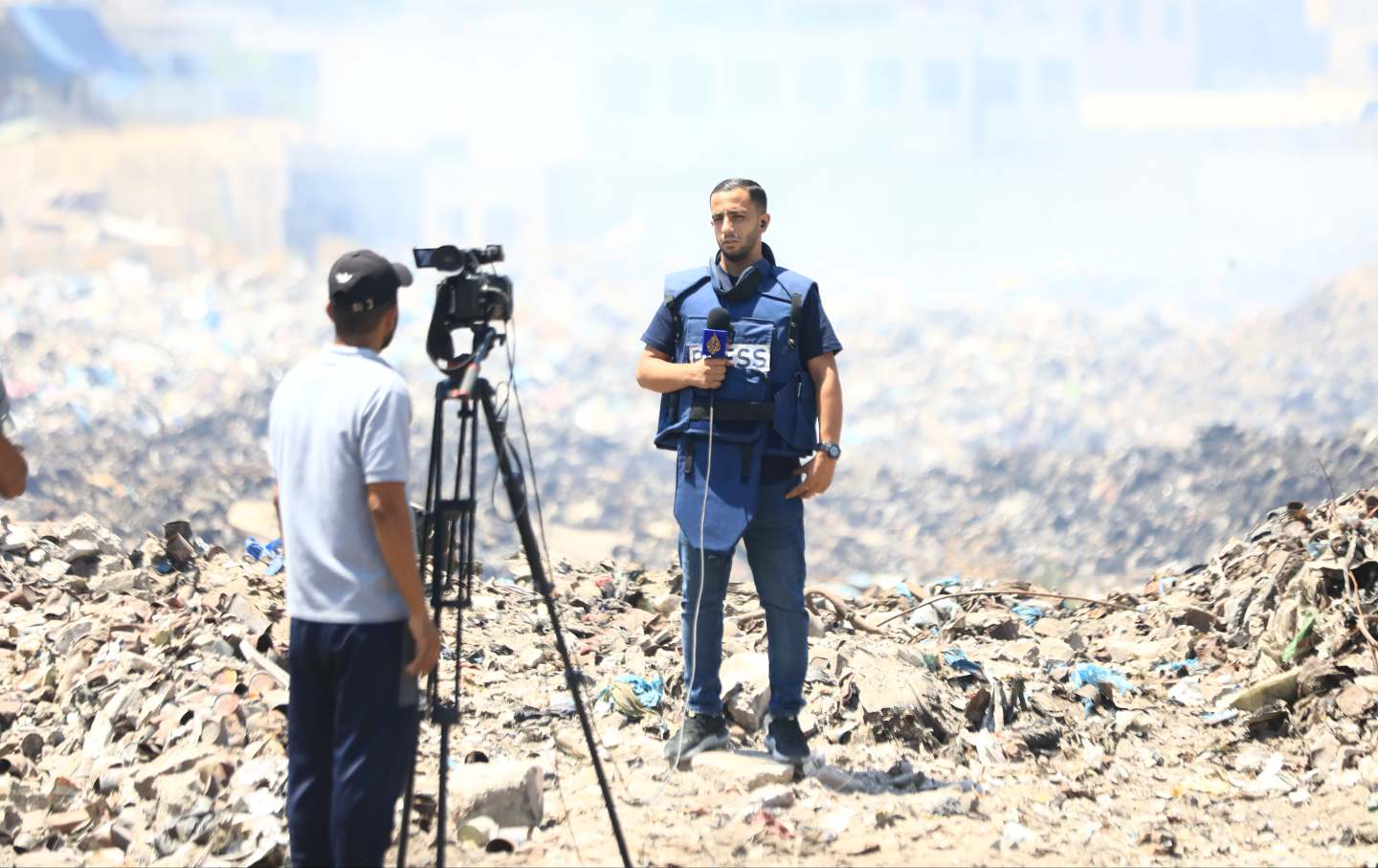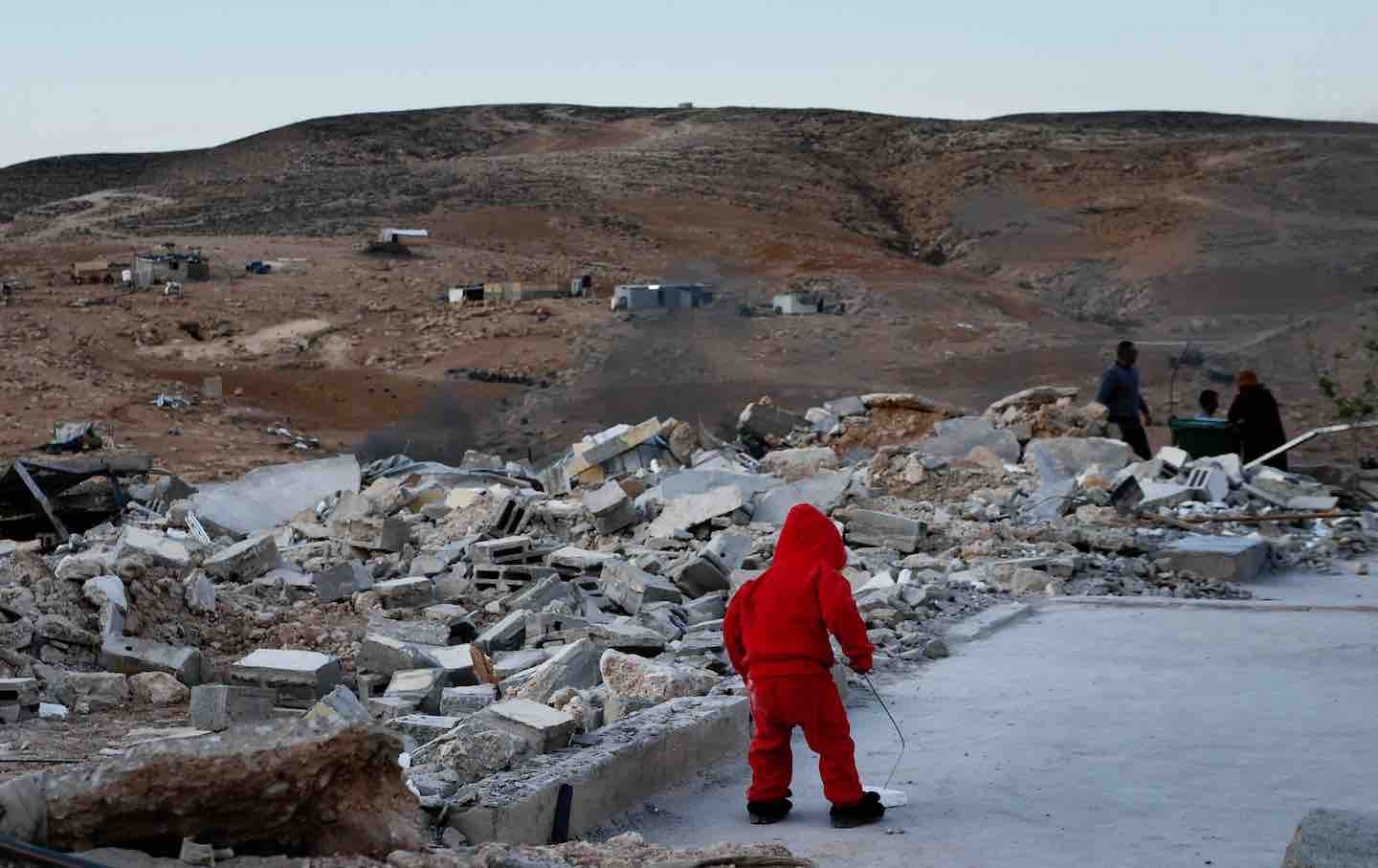A Deal Signed in Blood
An anticipated deal between the US, Saudi Arabia, and Israel is set to create a new Middle Eastern order. But as Israel and Gaza return to war, will the security pact do more than entrench the violence of the status quo?
A Mideast Deal Signed in Blood
As Israel and Gaza return to war, will a security pact between the US, Israel, and Saudi Arabia do more than entrench the violence of the status quo?
Palestinians inspect the damage following an Israeli air strike on the Sousi mosque in Gaza City on October 9, 2023.
(Majdi Fathi / NurPhoto / AP)Doha, Qatar—After speaking at a Georgetown University–Qatar conference at the Four Seasons Hotel, Khalid Fahad al-Khater, a senior Qatari diplomat, didn’t want to comment about the forthcoming diplomatic accord between the United States, Saudi Arabia, and Israel. When I pressed, he said simply that it would be a “game changer.” And he preferred to leave it at that.
I understood. Al-Khater didn’t want to say anything that might affect diplomatic maneuvering, influence financial markets, or otherwise blow back on him or Qatar. And outside of what we’ve read and heard, neither of us knew the details of what the tripartite deal holds.
But we were academics, politicians, activists, and journalists gathered against the backdrop of negotiations with the potential to transform—or, perhaps more accurately, reaffirm on explicit terms—the power dynamics of the Middle East. Recognition of Israel by the final major Arab power not to do so, without any pathway to Palestinian independence, and backed by an influx of American weaponry, closes the door on a generation’s worth of challenges to the US-backed Mideast order. Speculation was unavoidable. Everyone I spoke with, whether they thought the deal promising or catastrophic, considered it both historic and inevitable. They struggled to make sense of the new status quo they will inhabit. Then, just days later, nearly 1,200 miles but a world away from a luxury hotel in Doha, Hamas began what might be a game changer of its own.
Early Saturday morning, Hamas launched an air-sea-land surprise offensive from Gaza into Israel. Its operation responded to an extraordinarily violent year that followed the rise of Israel’s most-extreme-ever right-wing government: a year when Israeli soldiers and settlers have killed more than 200 Palestinians; locked thousands more to languish in military prisons; intensified assaults on West Bank villages like Jenin and Huwara; kept 2 million Palestinians under a blockade of Gaza that has left only an estimated 4 percent of households able to access clean drinking water; and attacked Palestine on symbolic levels, as when the anti-Palestinian Justice Minister Itamar Ben Gvir led multiple intrusions into the Al-Aqsa mosque in Jerusalem with the express aim of bringing one of the holiest sites in Islam under Israeli sovereignty.
The physical breach of Gaza’s 16-year blockade stunned Israel. The robust Israeli surveillance apparatus missed what was clearly a well-prepared operation, one roughly timed for the 50th anniversary of another war that began with an Israeli intelligence failure. As Hamas took both Israeli civilians and soldiers as hostages, apparently to barter for the imprisoned Palestinians, Israeli Prime Minister Benjamin Netanyahu declared “war, not an operation.” Terrified Israelis who seek only to live in safety ended the joyful holiday of Simchat Torah in horror, mourning what as of this writing is 900 dead, including at least 260 people killed at a rave in the Negev Desert shot up by Hamas. Palestinians who seek only to live in freedom—termed “human animals” by Israeli Defense Minister Yoav Gallant on Monday—mourned at least 560 people dead as they braced for the terrible reprisal Netanyahu has promised, which may include a reinvasion of Gaza.
At a minimum, the war complicated the timetable for a deal between Jerusalem and Riyadh, though no one I spoke with believes the deal is off. Even if the Hamas offensive is unrelated to the deal, it underscores the extreme danger to Palestinians that the deal represents. While the deal is likely to be the game changer al-Khater predicted, it reinforces the terms of the repressive US-backed status quo that has produced a wasteland for Palestinians and called it peace. It risks more periods of bloodshed like the one that began on Saturday.
The deal’s unfinalized terms are not yet public. But the contours of what Mideast leaders are already publicly discussing would be historic. Saudi Arabia, now the most powerful Arab state, would recognize Israel, opening an economic relationship and a political normalization that Israel has dreamed of for decades. The United States would broker the deal through expanded arms sales, security guarantees, and, most desired by Riyadh, a nuclear-energy program that would permit the Saudis to enrich uranium on their own soil—which experts fear could presage a Saudi nuclear weapon. Two weeks before Hamas launched its offensive, Netanyahu said the deal would “truly create a new Middle East.” That same week, President Joe Biden extended to Netanyahu a long-desired invitation to the White House.
It is not lost on anyone, least of all the Palestinians, that in 2002, then–Saudi Crown Prince Abdullah bin Abdul Aziz conditioned recognition for Israel on Palestinian statehood. Now–Saudi Crown Prince Mohammed bin Salman has removed that condition. During a September 20 interview with Fox News’s Bret Baier, MBS, as he’s known, committed only to “a good life for the Palestinians,” words that several of my interlocutors interpreted as Riyadh accepting indefinite occupation. But in the hours after Hamas overran the Erez crossing and briefly took territory across the border in Sderot, the Saudi foreign ministry said it had “repeatedly warned of the consequences…of the occupation.” Its statement was a deflection that the Saudis boxed themselves into by pursuing normalization with Israel while the occupation persists.
The idea of Saudi Arabia being a bulwark against Israeli violence is not a credible one. MBS’s deep-pocketed attempt to portray himself as a reformer has not covered up the violence of his regime. As defense minister, he was an architect of the devastation of Yemen. In 2017, he consolidated his rule by locking hundreds of Saudi notables, including his relatives, in a Ritz-Carlton for what became known as the “Night of the Beating.” The CIA named him personally accountable for the gruesome murder and dismemberment of mildly critical journalist Jamal Khashoggi. Much as MBS would like to be known for decarbonization, allowing women to drive, and building a Red Sea megacity, Saudi Arabia under MBS is a place where people can be killed for tweets. A man whose nicknames include Father of the Bullet and Mister Bone Saw is unlikely to find apartheid intolerable. And soon, thanks to the United States, he may be in position to go nuclear.
Nor is MBS likely to encounter significant internal pressure, some think. “The old guard, including the religious establishment, will likely not be supportive, but in a country where dissent is not tolerated, such sentiments will have to remain private,” says Safwan Masri, the dean of Georgetown University–Qatar. “The median age in Saudi Arabia is 29, and young Saudis care more about the social liberalizations and economic opportunities championed by Crown Prince Mohammed bin Salman.”
Indeed, the logic of the deal involves looking past the Palestinians as vestiges of an outdated order. It builds upon and surpasses the Trump administration’s 2020 Abraham Accords that normalized Israeli relations with the United Arab Emirates, Bahrain, Sudan, and Morocco. Israel-UAE normalization came through billions in US arms sales, and now the Israeli weapons-export sector is reaping the same from its new diplomatic interlocutors, even as Saudi Arabia has loomed as the grand prize for Israel. The commercial and security ties represent a formalization of a US-backed Middle Eastern security order centered around opposition to Iran—whose assertiveness found new opportunity in the region after the 2003 US occupation of Iraq brought chaos. Both the Abraham Accords and a Saudi-centric successor represent a bet that fears of Iran and trade prospects within an anti-Iranian belt spanning the peninsula are enough to cement a regional order, all under US auspices.
“The lie at the heart of American-led normalization is that this is peacemaking, and is somehow a substitute for dealing with the core Israeli-Palestinian issue, or, even more illogically, is a positive contribution in that arena,” says Daniel Levy, a former Israeli peace negotiator and president of the US/Middle East Project. “The accords, as choreographed by the US, intentionally keep in place an Israeli-Palestinian status quo which is antithetical to peace and security for all, including to equality and rights for the Palestinians. It is part of an architecture which encourages Israeli hubris and which has nurtured the very failings in the Israeli system which came into play so powerfully during the attacks carried out by the Gaza-based resistance movements.”
When the US champions resistance to occupation in Ukraine, it does so from the position, however cynically, of supporting a threatened democracy. There is no such veneer when it comes to a US-Saudi-Israel deal. Israel is an apartheid state whose government is working hard, against the wishes of enormous numbers of its citizens, at crippling its own democratic institutions, even as those institutions are unaccountable to its millions of Palestinian subjects. Saudi Arabia is an absolute monarchy that holds an abundance of capitalism’s most important commodity. It didn’t take long for Biden to unravel his promise to make Saudi Arabia “a pariah,” as continued dependence on hydrocarbons and rising gas prices stemming from US sanctions on Russian oil brought Biden to fist-bump MBS in Riyadh last year. That’s largely what prompted Secretary of State Antony Blinken to say, shortly before Biden’s trip, that, notwithstanding human-rights concerns with Saudi Arabia, “we are addressing the totality of our interests in that relationship.”
The additional incentive for the United States to foster the deal is its extensive, bipartisan paranoia over losing geopolitical primacy. MBS rolled out the red carpet for Chinese Premier Xi Jinping in December, a trip widely understood as an unveiling of Chinese power in the Middle East and an embrace widely understood as a rebuke to Biden. The month before, senior US officials told a regional security conference in Bahrain not to “hedge” against the US with China, as only the US could integrate its Middle Eastern clients’ militaries through the American defense technology it exports. That is true, but the Saudis will still hold a naval exercise with the Chinese in Zhanjiang this month. And it was Chinese diplomacy, not US security architecture, that produced détente between Riyadh and Tehran in March. Instead of pivoting to the possibilities for regional peace that such a détente offers, the Biden administration is looking to outdo China in a grand diplomatic gesture that anchors the US in the region on the terms of the status quo ante. The substance of it matters less than the fact of it.
The deal would certainly secure the US position in the Mideast as the security broker to the region’s two strongest powers. Among its most important reported aspects is the prospect of an expanded guarantee to Saudi Arabia to come to its aid militarily if attacked. It’s worth remembering that even without that explicit guarantee, the US went to war with Iraq in 1991 in no small part to defend the Saudis. But an explicit security guarantee would risk US involvement in a potentially catastrophic war with Iran. Iranian behavior strongly suggests the Iranians will consider an enhanced security relationship between its three geopolitical enemies as provocative, particularly if it carries the potential for MBS to go nuclear. Already, The Wall Street Journal has reported an Iranian role in the offensive, partially predicated on disrupting the deal, although this account is disputed by the Biden administration, Hamas, and Iran.
Another China-centric consideration for the United States is the Saudis’ flirtations with pricing oil in Chinese currency. An August Wall Street Journal piece on normalization floated getting Saudi Arabia to keep the petrodollar as an aspect of the deal. That would reap the US a material benefit from the deal beyond expanded arms sales. But some economists think that pricing oil in renminbi is a bluff—one that allows Saudi Arabia to present the continued life of the petrodollar as a tough concession it has made.
Popular
“swipe left below to view more authors”Swipe →“Saudi Arabia could sell its oil in yuan instead of dollars, but it is likely to do this only for a small portion of its exports to China, which in turn count for just 20 percent of Saudi Arabia’s total exports,” says Esfandyar Batmanghelidj, CEO of the Bourse & Bazaar Foundation, an economic think tank focused on the Middle East. Whatever else MBS can accomplish, dethroning the dollar is neither achievable for him nor in his interests. “Saudi Arabia’s geopolitical clout depends in large part on the fact that it is a country that earns petrodollars and spends them freely on American assets in liquid markets. Unless China liberalizes its capital markets, which looks increasingly unlikely, Saudi Arabia won’t be able to replicate the beneficial economic interdependence it currently enjoys with the United States.”
All that underscores how the deal reinforces the existing rules of the current Mideast order. A generation ago, resistance to the unofficial tripartite force of America, Saudi Arabia, and Israel spurred the creation of Al Qaeda. After the devastation of a still-ongoing War on Terror, the formalization and expansion of those ties risks provoking a new wave of violent challenge, perhaps taking unexpected forms, even as their architects consider them to herald a new era of regional peace.
The deal “will probably hasten the inevitable confrontation between the masses [and the regimes]—I wouldn’t say next year, or the year after, but I would say in a few years, there will be a huge backlash, because the Israelis are not going to stop,” says Sami al-Arian, director of the Center for Islam and Global Affairs in Istanbul, who is Palestinian.
Biden’s Saturday afternoon address on the attack did not mention Palestinian lives, only “Hamas terrorists.” On Sunday, Defense Secretary Lloyd Austin moved the destroyers and warplanes of the USS Gerald Ford carrier strike group to the eastern Mediterranean. Western governments lined up to condemn Hamas and not the Israeli occupation. Gallant, the Israeli defense minister whom Austin was in contact with throughout the weekend, said on Monday that he has ordered that Gaza be under a “full siege,” with no electricity, gas, water, or food permitted into the Strip, all while he called Palestinians subhuman. Netanyahu chillingly pledged a response that would “change the Middle East,” after telling Palestinians to flee Hamas-controlled parts of Gaza, whose borders Israel and Egypt have sealed, before he turns them “into ruins.”
“It’s the hardest time,” says Levy, referring to the anguish of Israelis and the forthcoming Israeli assault on Gaza. “But,” he continues, it’s “the most important time to remind ourselves that security for Israelis and security for Palestinians are intertwined, and you will not get one without the other. Even against the backdrop of the painful scenes, Israel is the occupying party which makes Palestinian lives abnormal every day in denying them the most basic rights and freedoms and predictability of life which we take for granted.”
The looming bloodshed could put pressure on even an unaccountable figure like MBS. Asked if MBS can produce a deal while the Israeli military pummels Gaza, a Saudi analyst who requested anonymity during a sensitive moment says only that it would “be difficult,” and that the Saudis need a “cease-fire” before the deal can proceed. “Things will be on ice for a while,” a Saudi official told The Wall Street Journal.
“The Israel-Saudi deal may be delayed, but I believe it will happen,” says Mehran Kamrava, a professor of government at Georgetown–Qatar. If anything, the war creates an opportunity for MBS to increase the price on Biden, who Kamrava thinks will pay to have a major deal secured by the 2024 election. “Whether the Saudi government can bear the domestic political costs of normalization with Israel in the likelihood of massive Palestinian loss of life and indiscriminate Israeli destruction of lives and property in Gaza remains to be seen,” Kamrava continues.
Al-Arian thinks the outbreak of war means the deal won’t happen until at least 2025, as MBS has no incentive to give Biden a major diplomatic victory and would get better terms from his favored candidate, Donald Trump, unless Biden wins reelection anyway. But while the deal might change certain regional dynamics, “it’s not going to change the calculus of Palestinian resistance or Palestinian aspirations for self-determination, freedom, independence, and liberation,” he says. Netanyahu and the Israeli right might hope that a US-backed deal with Saudi Arabia represents a green light for a 1948-style mass deportation. But al-Arian considers that a delusion.
“If we have to die,” he says, “we’ll die in our homes. We’re not going anywhere.”
Can we count on you?
In the coming election, the fate of our democracy and fundamental civil rights are on the ballot. The conservative architects of Project 2025 are scheming to institutionalize Donald Trump’s authoritarian vision across all levels of government if he should win.
We’ve already seen events that fill us with both dread and cautious optimism—throughout it all, The Nation has been a bulwark against misinformation and an advocate for bold, principled perspectives. Our dedicated writers have sat down with Kamala Harris and Bernie Sanders for interviews, unpacked the shallow right-wing populist appeals of J.D. Vance, and debated the pathway for a Democratic victory in November.
Stories like these and the one you just read are vital at this critical juncture in our country’s history. Now more than ever, we need clear-eyed and deeply reported independent journalism to make sense of the headlines and sort fact from fiction. Donate today and join our 160-year legacy of speaking truth to power and uplifting the voices of grassroots advocates.
Throughout 2024 and what is likely the defining election of our lifetimes, we need your support to continue publishing the insightful journalism you rely on.
Thank you,
The Editors of The Nation
More from The Nation
Letters: Internal Dissent Letters: Internal Dissent
Readers respond to an article by our interns disagreeing with The Nation’s endorsement of Kamala Harris for president.
In New York, Progressive Values Have a Line on the Ballot In New York, Progressive Values Have a Line on the Ballot
I can’t support the Democratic Party position on Gaza, yet I recognize that Trump would be even worse. That’s why I’m voting for Harris on the Working Families P...
Israel Is Still Targeting Palestinian Journalists. Silence Is Not an Option. Israel Is Still Targeting Palestinian Journalists. Silence Is Not an Option.
Journalists around the world have an urgent duty to stand with their peers in Gaza. Instead, too many are saying nothing.
“No Other Land” and the Brutal Truth of Israel’s Occupation “No Other Land” and the Brutal Truth of Israel’s Occupation
The unsparing documentary—one of the year’s most powerful films—has still not found a distributor in the US.
The North of Gaza Is an Open Graveyard The North of Gaza Is an Open Graveyard
For those trapped in northern Gaza, Israel’s ‘Surrender or Starve’ policy means the possibility of death in one way or another, at any moment.
We Are Failing Children Around the World With Our War-Making We Are Failing Children Around the World With Our War-Making
What today’s conflicts are doing to the children trapped by them.









